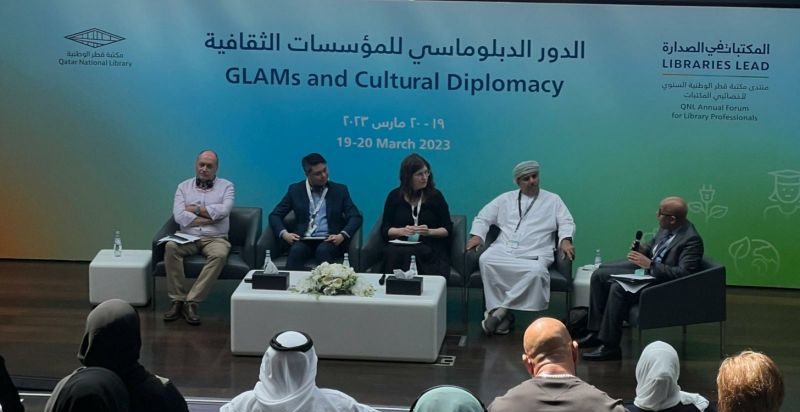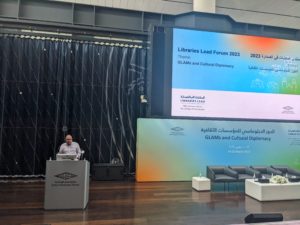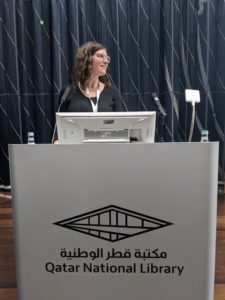IFLA at the QNL Libraries Lead Forum: GLAMs and Cultural Diplomacy
22 March 2023
Qatar National Library held its second annual Libraries Lead Forum from 19-20 March 2023 in Doha, Qatar. This year’s forum explored how galleries, libraries, archives, and museums (GLAM institutions) carry out cultural diplomacy.
QNL invited scholars and representatives from GLAM institutions and associations to share experiences. The discussion helped to define the parameters, modalities, and good practices for the role of GLAM in cultural diplomacy at inter-personal, institutional, and national levels.

Cultural Diplomacy and Libraries
The specific exploration of cultural diplomacy, as opposed to more generic discourse on cultural diversity and multicultural exchange, is an interesting angle for the global library field to consider. The concept of diplomacy may be more traditionally associated with the exercise of soft power, or the attempted influence of behaviours and ideas that align with interests of the State.
However, in today’s interconnected world, where nations are facing collective challenges and working within shared frameworks, such as the Sustainable Development Goals, diplomacy may now be considered a multilateral, shared experience. With a focus on cross-cultural and reciprocal forms of cultural exchange, with the goal of promoting greater understanding, cultural diplomacy could now be viewed as a mutually beneficial process of building trust and fostering relationships.
For libraries, whose missions include the preservation of and access to common knowledge, cultural heritage, and information in its diversity, this creation of dialogue and fostering of intercultural exchange can be regarded as a source of soft power. In terms of advocacy, it is worth reflecting on how libraries apply this power to achieve goals that benefit global librarianship, as well as development goals at the local, national, and international levels.
Voices from the Library Field
Several members of IFLA’s professional programme were featured at the Forum and shared their perspectives. Susan Parker Leavy, Head of the Qatar Museum of Islamic Art Library and Information Officer for IFLA’s Art Libraries Section, spoke to interpersonal cultural diplomacy through an example carried out at the library.
In 2022, the library was awarded a Guinness World Record for the most languages used in a reading relay. This project used the ambitious but achievable goal to bring together a large group of international community members and promote a love for language and reading. Engagement with the media broadcasted this project widely, and a shared sense of achievement, ownership, and interest in one another’s languages and cultures.
Stephane Ipert, Director of Distinctive Collections and of IFLA’s Preservation and Conservation (PAC) Centre hosted at QNL, spoke to the interactions between cultural diplomacy and the countering of cultural heritage theft and trafficking.

He highlighted that in the cases of criminal theft and trafficking, the process of applying justice and restitution depends on cultural diplomacy. In this, he highlighted the PAC Centre’s Himaya Project, which has been making considerable accomplishments in countering the sale of items of documentary heritage stolen from the MENA region and neighbouring countries.
He also noted that cases of restitution of cultural property resulting from colonialism may not be able to follow the same legal procedure. Diplomacy is central to such cases, which require lawmakers to choose to act in the spirit of trust-building and reconciliation.
International Perspectives
IFLA headquarters, represented by Policy and Research Officer Claire McGuire, was also delighted to

join the lineup of speakers. She brought the perspective of the role that international professional organisations have in both engaging with, as well as enabling members to engage with, diplomacy.
Bringing professionals together from around the world to exchange perspectives and work collaboratively is a central part of IFLA’s DNA. In this, she suggested the power of a common goal, such as the preservation of cultural heritage, realisation of human rights, and provision of access to information, for bringing people together and fostering partnership and trust.
She highlighted the work of IFLA’s PAC Centres in reaching out to libraries in their regions and beyond to exchange information and build mutual capacity. In discussing opportunities offered by technology, she noted IFLA’s Digital Unification Guidelines, and the potential for forging international relationships with other cultural institutions in the pursuit of bringing a collection together virtually.
She noted the work that IFLA carries out at the international level, to advocate for the role of libraries in achieving larger social goals and influencing policy. In this, she noted that IFLA carried out some advocacy work in cooperation with international coalitions of partners. One such example is the Culture 2030 Goal Campaign, in which IFLA collectively works for greater recognition of culture’s role in the SDGs, and the inclusion of a culture-specific goal in the post-2030 development framework.
Complementing the international look, Dr. Nabhan Al Harrasi, President of the Arab Federation for Libraries and Information, brought a regional perspective to libraries carrying out cultural diplomacy.
Framing Future Action
For libraries interested in the concept of cultural diplomacy, a framework suggested by panellist Randolf Mariano, University of Tromsø, could help define practical action areas. This framework considers three angles of diplomacy:
- Libraries in diplomacy: what can libraries do to influence policy actions, for example through advocacy activities?
- Diplomacy for libraries: how can international cooperation advance library practices and help bolster the sustainability of the profession?
- Libraries for diplomacy: how can libraries use their collections, spaces, and programmes to foster relationship building, dialogue, and multicultural understanding?
Assessing the goals and needs of one’s community and country may be a good place to begin. Considering whose cultures are being served, represented, and preserved, and then determining whose are left out, is a starting point at the community level.
Engaging in global librarianship activities, such as through IFLA’s professional programme, is an example of utilising cultural diplomacy for the mutual benefit of the library field.
Viewing challenges facing your country, like proliferation of disinformation, xenophobia, theft and trafficking of cultural property, and social injustices could be an entry point to framing actions that can help apply library resources to diplomatic efforts.
IFLA thanks QNL for stimulating this discourse and for inviting us to share perspective.